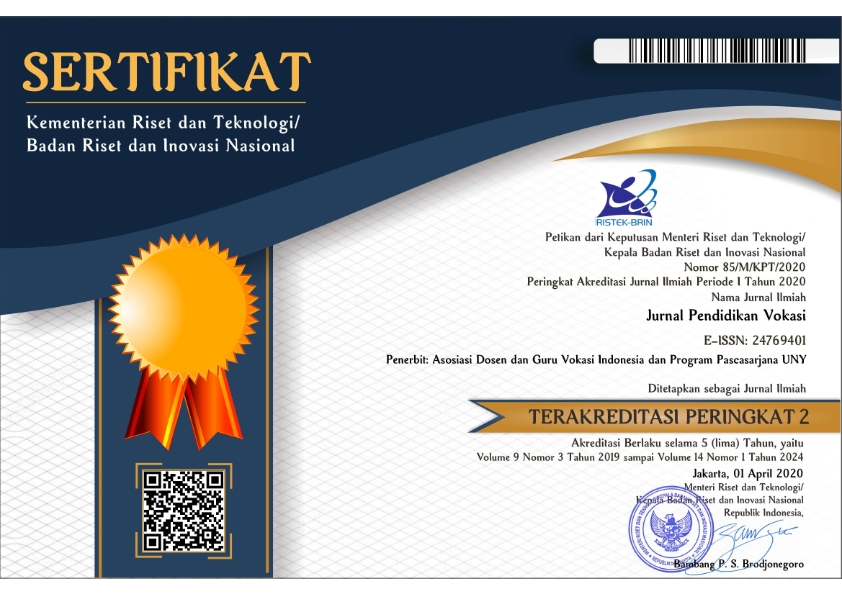Employability skills of vocational school students in Palu City for entering the work world
DOI:
https://doi.org/10.21831/jpv.v9i1.23351Keywords:
descriptive, employability skills, work worldAbstract
This study aims to determine how much the level of employability skills of students of State Vocational Schools in Palu City. This type of research is a type of survey that is to describe the attitudes, behaviors, and opinions of students' research employability skills using a quantitative deskriptive approach, then the results of data analysis are described qualitatively, then presented in graphs, diagrams, tables, mean, modes, medians, standard deviation and variant. The population in this study was 1,275 students with a study sample of 295 students. The data collection technique used is using a questionnaire. The results of the study indicate that the level of employability skills of vocational students in Palu is generally categorized as very high. The high level of employability skills of students in the State Vocational School in Palu should be a supporting factor for students to get decent work and in accordance with their competency skills so that stakeholders, especially the school must really use it well.
References
Bennett, T. M. (2006). Defining the importancei of employability skills in career/technical education.Dissertation (unpublished).Auburn, Alabam: the Graduate Faculty of Auburn University
Clark,L. & Winch, C.(2007). Vocational Education International Approaches, Developments and Sistems.New York: Routledge.
Cleary, M., Flynn, R., Thomasson, S., Alexander, R., & McDonald, B. (2007). Graduate employability skills: Prepared for the business, industry and higher education collaboration council. Melbourne: Precision Consultancy.
Esposto, A., & Meagher, G.A. (2007).The future demand for employability skills and the implications for the VET system. Rereieved 27 October 2017 from http://www.avetra.org.au/publications/12-Esposto.pdf
Gibb, J. (2004). Generic skills in vocational education and training.Adelaide SA: National Centre for Vocational Education ResearchLtd
Gowsalya, G., & Kumar,A. (2015). Employability Skill: A Literature Review. International Journal of Advance Research in Computer Science and Management Studies, 3(3)353-360
Hanafi, I. (2012). Re-orientasi keterampilan kerja lulusan pendidikan kejuruan. Jurnal Pendidikan Vokasi, 2(1). doi:https://doi.org/10.21831/jpv.v2i1.1021
Hanafi, I. (2014). Pendidikanteknik dan vokasional: Menggali pengalaman sukses Institusi Bi-National di negeri Jiran, dari konsep hingga implementasi. Bandung: Refika Aditama
Hartiningtyas, L., Purnomo, & Elmunsyah, H. (2016). Hubungan antara self regulated learning dan locus of control internal dengan kematangan vokasional siswa SMK. Jurnal Pendidikan: Teori, Penelitian, dan Pengembangan, 1(6). 1127-1136
Kavoura, A. (2013). Politics of Heritage promotion: Branding the identity of the Greek state. Tourism Culture and Communication, 12, 69-83.
Kuncoro. (2009). Pendidikan dan Pembelajaran.Surakarta: Media Citra Lestari.
Robinson, J.P. (2000). What are employability skills?. The Workplace, 1(3).Retrieved 10 September 2017 from http://stlwebdev.us/careerdev/documents/Employability-Skills.pdf
Sakas, D., Vlachos, D., & Nasiopoulos, D. (2014). Modelling strategic management for the development of competitive advantage, based on technology. Journal of Systems and Information Technology. 187 -209.
Smith, E. & Comyn, P. (2003). The development employability skills in novice workers.Adelaide, Australia: National Centre for Vocational Education Research.
Asonitou, S. (2015). Employability Skills in Higher Education and the Case of Greece.Procedia -Socialand Behavioral Sciences, 175. 283 –290.
Sudira, P. (2016). TVET ABAD XXI Filosofi, Teori, Konsep, dan Strategi Pembelajaran Vokasional. Yogyakarta: UNY Press.
Sudira, P. (2011). Praksis Ideologi Tri Hita KaranaDalam Pembudayaan Kompetensi Pada Smk di Bali. Disertasi,tidak diterbitkan, Universitas Negeri Yogyakarta, Yogyakarta.
Sugiyono. (2010). Metode penelitian pendidikan, Pendekatan kuantitatif, kualitatif dan R&D.Bandung: Alfabeta.
Tome, E. (2007). Employability, Skills, and Training in Portugal (1988-2000): Evidance from Official Data. Journal of European Industrial Training, 31(5),336-357.
UNESCO. (2012). Youth and skills: putting education to work.Paris: UNESCO Publishing
Wagiran. (2009). Paradigma peningkatan mutu lulusan SMK melalui integrasi soft skills untuk menghasilkan lulusan unggul dan berdaya saing. In Seminar Nasional Paradigma Baru Mutu Pendidikan di Indonesia, Lembaga Penelitian Universitas Negeri Yogyakarta
Wagiran. (2013). Metodelogi penelitian Pendidikan: Teori dan Implementasi.Yogyakarta: Deepublish.
Downloads
Published
How to Cite
Issue
Section
License
The authors submitting a manuscript to this journal agree that, if accepted for publication, copyright publishing of the submission shall be assigned to Jurnal Pendidikan Vokasi. However, even though the journal asks for a copyright transfer, the authors retain (or are granted back) significant scholarly rights.
The copyright transfer agreement form can be downloaded here: [JPV Copyright Transfer Agreement Form]
The copyright form should be signed originally and sent to the Editorial Office through email to jpvokasi@uny.ac.id
Jurnal Pendidikan Vokasi by http://journal.uny.ac.id/index.php/jpv is licensed under a Creative Commons Attribution-ShareAlike 4.0 International License.














